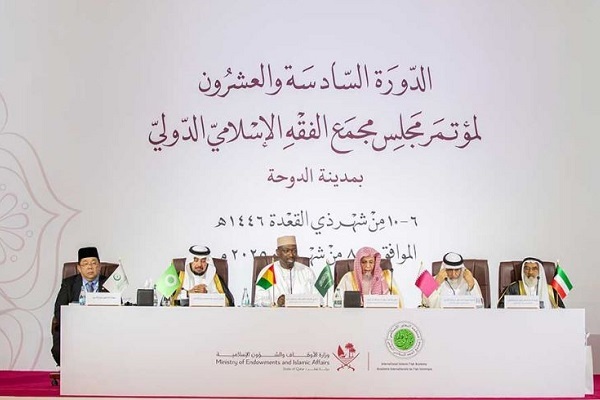Fiqh Conf. Wraps Up in Qatar with Rulings on AI, Games, Mental Health, Child Welfare

The session explored a range of pressing contemporary issues, including child welfare, the jurisprudential principle of istishab (presumption of continuity) and its modern applications, Islamic rulings and ethical considerations related to artificial intelligence, electronic gaming, and third-party loan interest payments.
The IIFA, operating under the umbrella of the Organization of Islamic Cooperation (OIC), emphasized that the responsibility of safeguarding and nurturing children falls jointly on the family, society, and the state, both legally and ethically. It called for preserving children's Islamic and national identity.
Conference recommendations stressed the need to protect children from all forms of harm, including physical and emotional abuse, extortion, bullying, harassment, whether verbal, sexual, or cyber; and various forms of violence. It held parents accountable for protecting children during armed conflicts, wars, and displacement, underlining the importance of preserving children's gender identity to ensure their natural development.
The IIFA also emphasized the need to raise morally grounded children equipped for the digital world. It urged families to monitor children's access to digital platforms to prevent exposure to inappropriate content or misinformation. It called for increased care for children with special needs and greater efforts toward their integration into society through inclusive environments.
Read More:
Among the key recommendations were calls to instill Islamic values and religious practices in children, formulate a comprehensive Islamic strategy for child welfare and Islamic media, and incorporate these principles into national legislation. The IIFA urged the development of awareness guides for professionals working with children, support for physical training programs, especially through dedicated endowments for children with special needs, and the organization of workshops to educate Muslim parents on contemporary childhood challenges, preserving religious identity, and fostering innate human dignity.
Regarding the principle of istishab, the Academy affirmed it as a legitimate legal tool that maintains the status of a prior ruling rather than establishing new ones. It explained that istishab can be used for both affirming and denying legal conditions depending on the state of certainty or doubt.
On artificial intelligence, the IIFA recommended further study on the legal personality of AI and called for specialized symposia to examine AI developments and ethics.
As for third-party loan interest payments and rulings on guarantees and letters of credit, the Academy decided to defer these matters for further study.
On digital and electronic games, the Academy defined them as interactive physical and mental activities through modern technology or digital platforms, such as action, adventure, puzzle, and sports games. It ruled that playing digital games is permissible, provided they do not include religious or moral violations, nor cause harm to faith, intellect, body, wealth, or others. The production and trade of digital games and prepaid game cards were also deemed permissible under these conditions.
The IIFA recommended the development of digital education manuals and the establishment of regulatory frameworks to limit the risks of digital games. It also called for active parental and societal oversight, awareness campaigns across media platforms about the pros and cons of such games, and guidance for developers to create engaging, values-based alternatives.
With regard to mental health and legal capacity, the Academy categorized psychological disorders into three types based on their impact on awareness, understanding, and decision-making. It emphasized that assessments of mental illness and its effects on legal competence should be made by qualified psychiatric professionals.
Read More:
The IIFA also recommended awareness programs for judges and religious scholars on the legal implications of mental illness, alongside joint training sessions for jurists and mental health professionals to produce comprehensive guidelines.
On financial regulations, the Academy affirmed prior decisions concerning the importance of Sharia oversight in Islamic banking, including its roles, conditions, methods, and independence. It stressed the need for a unified framework of rules and procedures to balance religious compliance with economic goals in Islamic financial institutions.
The IIFA called for a unified reference framework for the Islamic financial industry that preserves its identity and guides credit decisions across member states and Muslim communities.
Regarding the issue of feeding premature infants with donated milk, the IIFA defined breastfeeding as the process of milk from a woman reaching the stomach of a child under two years old. Premature infants, those born before completing 37 weeks of gestation, are entitled to breastfeeding, whether from their mothers or other donors. Donors have the right to request confidentiality regarding their identities.
The Academy urged health authorities to implement legal frameworks governing milk donation to safeguard the rights and well-being of this vulnerable group, and called on health ministries to ensure adequate care and support initiatives for them.
On the matter of lab-grown meat, the Academy approved its consumption and marketing under specific conditions: the source cells must come from animals permissible to eat and, where applicable, slaughtered according to Islamic law, not cultivated in prohibited substances such as blood, and developed under trustworthy regulatory supervision. It also stressed the need for full consumer transparency, adherence to food safety standards, and ensuring such products complement rather than replace traditional meat sources.
Finally, on genetically modified (GM) foods, the IIFA permitted their consumption when sourced from animals permissible to eat, provided the modification processes are safe, Sharia-compliant, and non-harmful to health. It emphasized the importance of disclosing relevant information about GM foods and their preparation methods.
Source: Qatar News Agency (QNA)



